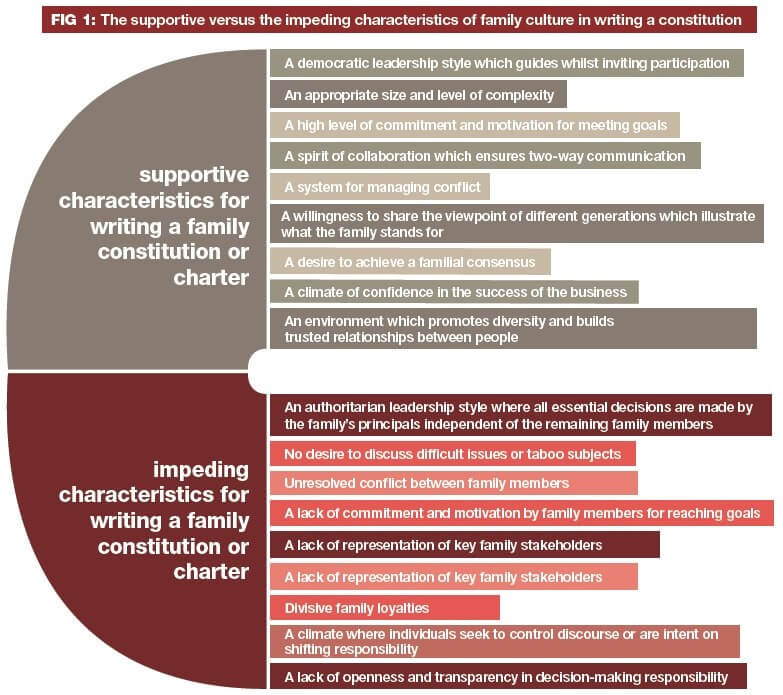Writing a family constitution is a demanding process under even the best of circumstances. Aside from a family business being required to recognise and agree to formulating such a document, the family will also find itself confronted with its own culture. Culture, whether defined by the context of the family business or the family itself, has a great impact on how successful writing a constitution can be. In the following article, Mark Evans, Managing Director, Coutts Institute, Coutts, explores the characteristics, which make a family likely to fail or succeed at the arduous task of formulating the family charter.
It is generally accepted that the main reasons for family business failure are based on a lack of trust, communication, and planning. Writing a family constitution or charter can help families avoid all of these potential pitfalls. The driving force behind the writing of a family constitution’s importance lies in its ability to bring the family together to discuss and agree on issues such as values, vision, purpose and code of conduct. Key to making this a successful experience is the family business understanding the family’s culture and where necessary, altering it. If the family business culture is not inclusive and there’s no desire to change, developing a family charter will only heighten family differences. If the family business culture is all-encompassing, or there is a desire to change the culture, it could create a stronger bond. A family constitution can be the difference between the family business succeeding or failing.
[ms-protect-content id=”4069,4129″]
When considering the impact of a family’s business culture on the writing of the family constitution or charter, it is worth noting the work of American academic W. Gibb Dyer Jr.
Dyer Jr. defines the four different types of family business cultures as paternalistic (hierarchical), laissez-faire (lineal), participative (group orientated) and professional (individualistic). In his paper ‘Culture and Continuity in Family Firms’, Dyer Jr. also describes the four levels of culture: artefacts (physical aspects of culture such as company logo, physical layout of the office), perspectives (rules of conduct), values (the philosophy espoused by the group) and assumptions (premises upon which the artefacts, perspectives and values are based).
Family business culture is often strongly impacted by the societal culture the family business is embedded within (East or West; traditional, modern or post-modern; collectivist or individualistic). In other words, a paternalistic family business culture in a traditional society, where an emphasis supporting a respect for the existing social order exists, will have a different impact on the writing of a family business constitution or charter than one oppositely defined. For example, a paternalistic family business culture in a modern society, where the emphasis is focused more centrally on economic progress, would require a completely separate approach.
A family culture based on the characteristics below is likely to provide a good foundation for writing a family constitution or charter:
• A democratic leadership style which guides whilst inviting participation
• An appropriate size and level of complexity
• A high level of commitment and motivation for meeting goals
• A spirit of collaboration which ensures two-way communication
• A system for managing conflict
• A willingness to share the viewpoint of different generations which illustrate what the family stands for
• A desire to achieve a familial consensus
• A climate of confidence in the success of the business
• An environment which promotes diversity and builds trusted relationships between people
A family culture based on the characteristics below is likely to find challenges when writing a constitution or charter:
• An authoritarian leadership style where all essential decisions are made by the family’s principals independent of the remaining family members
• No desire to discuss difficult issues or taboo subjects
• Unresolved conflict between family members
• A lack of commitment and motivation by family members for reaching goals
• A lack of representation of key family stakeholders
• Divisive family loyalties
• A climate where individuals seek to control discourse or are intent on shifting responsibility
• A lack of openness and transparency in decision-making
Needless to say, the family business culture does not have to be perfect to begin the process of writing a family constitution or charter. A catalyst for agreeing to the process may be a lack of understanding by a younger generation for the vision of the business or a dissonance of shared values between generations. Negative attitudes toward the family business may also exist within succeeding generations if they feel a lack of career decision freedom.
The family’s collective expectations should also be aligned in order to gather a universal commitment to the lengthy, sometimes years long process that writing a family charter may entail. The obligation will involve a strong pledge, which will serve to make long-term decisions aimed at the general welfare of the family and its enterprise.
Methods with which families can create a family business culture to support the writing of a family constitution or charter by encouraging open and honest communication include:
• Encourage regular meetings and social occasions amongst family shareholders
• Promote the advantages of being part of a family in business together
• Ensure that family values are clearly articulated and understood by the family
• Foster an environment which allows the next generation to talk openly about their aspirations and expectations
• Create a climate of meritocracy, where talented employees are invited to apply for leadership roles and are likewise treated fairly in the selection process
• Perform an assessment on the culture of the family business
• Source input from the family in considering a family constitution
• Establish the criteria for involving family members in discussing and agreeing on policies
• Regularly review company policies
• Consider appointing an independent family business consultant to help facilitate the process from its inception
As awareness of family constitutions and charters grow, there is a danger that they may be seen as a panacea for a plethora of challenges that family businesses might be facing. In reality, a strong culture of collaboration will enable family members to voice their opinions. This culture of openness will naturally lead to more families eager to embrace the process of writing a family constitution − no matter how demanding. What families learn from the process has the potential to produce significant social and commercial benefits.
Tharawat Magazine, Issue 18, 2013
[/ms-protect-content]















